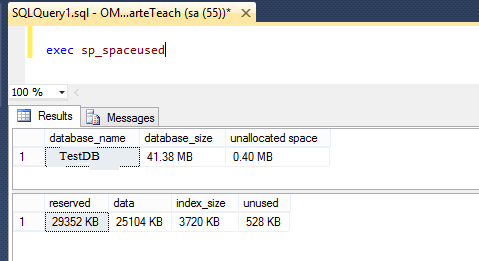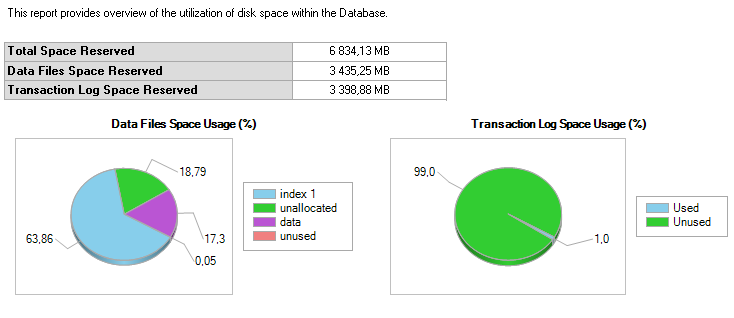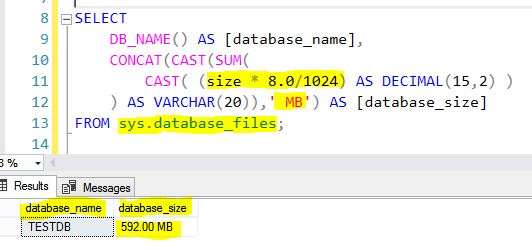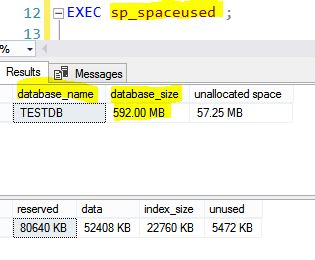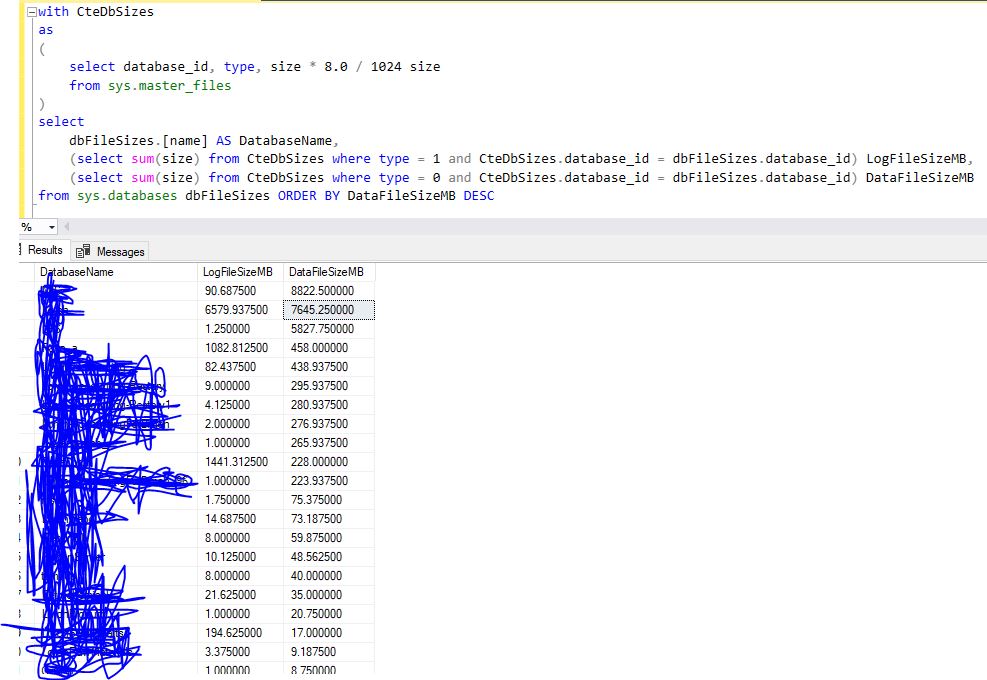Try this one -
Query:
SELECT
database_name = DB_NAME(database_id)
, log_size_mb = CAST(SUM(CASE WHEN type_desc = 'LOG' THEN size END) * 8. / 1024 AS DECIMAL(8,2))
, row_size_mb = CAST(SUM(CASE WHEN type_desc = 'ROWS' THEN size END) * 8. / 1024 AS DECIMAL(8,2))
, total_size_mb = CAST(SUM(size) * 8. / 1024 AS DECIMAL(8,2))
FROM sys.master_files WITH(NOWAIT)
WHERE database_id = DB_ID() -- for current db
GROUP BY database_id
Output:
-- my query
name log_size_mb row_size_mb total_size_mb
-------------- ------------ ------------- -------------
xxxxxxxxxxx 512.00 302.81 814.81
-- sp_spaceused
database_name database_size unallocated space
---------------- ------------------ ------------------
xxxxxxxxxxx 814.81 MB 13.04 MB
Function:
ALTER FUNCTION [dbo].[GetDBSize]
(
@db_name NVARCHAR(100)
)
RETURNS TABLE
AS
RETURN
SELECT
database_name = DB_NAME(database_id)
, log_size_mb = CAST(SUM(CASE WHEN type_desc = 'LOG' THEN size END) * 8. / 1024 AS DECIMAL(8,2))
, row_size_mb = CAST(SUM(CASE WHEN type_desc = 'ROWS' THEN size END) * 8. / 1024 AS DECIMAL(8,2))
, total_size_mb = CAST(SUM(size) * 8. / 1024 AS DECIMAL(8,2))
FROM sys.master_files WITH(NOWAIT)
WHERE database_id = DB_ID(@db_name)
OR @db_name IS NULL
GROUP BY database_id
UPDATE 2016/01/22:
Show information about size, free space, last database backups
IF OBJECT_ID('tempdb.dbo.#space') IS NOT NULL
DROP TABLE #space
CREATE TABLE #space (
database_id INT PRIMARY KEY
, data_used_size DECIMAL(18,2)
, log_used_size DECIMAL(18,2)
)
DECLARE @SQL NVARCHAR(MAX)
SELECT @SQL = STUFF((
SELECT '
USE [' + d.name + ']
INSERT INTO #space (database_id, data_used_size, log_used_size)
SELECT
DB_ID()
, SUM(CASE WHEN [type] = 0 THEN space_used END)
, SUM(CASE WHEN [type] = 1 THEN space_used END)
FROM (
SELECT s.[type], space_used = SUM(FILEPROPERTY(s.name, ''SpaceUsed'') * 8. / 1024)
FROM sys.database_files s
GROUP BY s.[type]
) t;'
FROM sys.databases d
WHERE d.[state] = 0
FOR XML PATH(''), TYPE).value('.', 'NVARCHAR(MAX)'), 1, 2, '')
EXEC sys.sp_executesql @SQL
SELECT
d.database_id
, d.name
, d.state_desc
, d.recovery_model_desc
, t.total_size
, t.data_size
, s.data_used_size
, t.log_size
, s.log_used_size
, bu.full_last_date
, bu.full_size
, bu.log_last_date
, bu.log_size
FROM (
SELECT
database_id
, log_size = CAST(SUM(CASE WHEN [type] = 1 THEN size END) * 8. / 1024 AS DECIMAL(18,2))
, data_size = CAST(SUM(CASE WHEN [type] = 0 THEN size END) * 8. / 1024 AS DECIMAL(18,2))
, total_size = CAST(SUM(size) * 8. / 1024 AS DECIMAL(18,2))
FROM sys.master_files
GROUP BY database_id
) t
JOIN sys.databases d ON d.database_id = t.database_id
LEFT JOIN #space s ON d.database_id = s.database_id
LEFT JOIN (
SELECT
database_name
, full_last_date = MAX(CASE WHEN [type] = 'D' THEN backup_finish_date END)
, full_size = MAX(CASE WHEN [type] = 'D' THEN backup_size END)
, log_last_date = MAX(CASE WHEN [type] = 'L' THEN backup_finish_date END)
, log_size = MAX(CASE WHEN [type] = 'L' THEN backup_size END)
FROM (
SELECT
s.database_name
, s.[type]
, s.backup_finish_date
, backup_size =
CAST(CASE WHEN s.backup_size = s.compressed_backup_size
THEN s.backup_size
ELSE s.compressed_backup_size
END / 1048576.0 AS DECIMAL(18,2))
, RowNum = ROW_NUMBER() OVER (PARTITION BY s.database_name, s.[type] ORDER BY s.backup_finish_date DESC)
FROM msdb.dbo.backupset s
WHERE s.[type] IN ('D', 'L')
) f
WHERE f.RowNum = 1
GROUP BY f.database_name
) bu ON d.name = bu.database_name
ORDER BY t.total_size DESC
Output:
database_id name state_desc recovery_model_desc total_size data_size data_used_size log_size log_used_size full_last_date full_size log_last_date log_size
----------- -------------------------------- ------------ ------------------- ------------ ----------- --------------- ----------- -------------- ----------------------- ------------ ----------------------- ---------
24 StackOverflow ONLINE SIMPLE 66339.88 65840.00 65102.06 499.88 5.05 NULL NULL NULL NULL
11 AdventureWorks2012 ONLINE SIMPLE 16404.13 15213.00 192.69 1191.13 15.55 2015-11-10 10:51:02.000 44.59 NULL NULL
10 locateme ONLINE SIMPLE 1050.13 591.00 2.94 459.13 6.91 2015-11-06 15:08:34.000 17.25 NULL NULL
8 CL_Documents ONLINE FULL 793.13 334.00 333.69 459.13 12.95 2015-11-06 15:08:31.000 309.22 2015-11-06 13:15:39.000 0.01
1 master ONLINE SIMPLE 554.00 492.06 4.31 61.94 5.20 2015-11-06 15:08:12.000 0.65 NULL NULL
9 Refactoring ONLINE SIMPLE 494.32 366.44 308.88 127.88 34.96 2016-01-05 18:59:10.000 37.53 NULL NULL
3 model ONLINE SIMPLE 349.06 4.06 2.56 345.00 0.97 2015-11-06 15:08:12.000 0.45 NULL NULL
13 sql-format.com ONLINE SIMPLE 216.81 181.38 149.00 35.44 3.06 2015-11-06 15:08:39.000 23.64 NULL NULL
23 users ONLINE FULL 173.25 73.25 3.25 100.00 5.66 2015-11-23 13:15:45.000 0.72 NULL NULL
4 msdb ONLINE SIMPLE 46.44 20.25 19.31 26.19 4.09 2015-11-06 15:08:12.000 2.96 NULL NULL
21 SSISDB ONLINE FULL 45.06 40.00 4.06 5.06 4.84 2014-05-14 18:27:11.000 3.08 NULL NULL
27 tSQLt ONLINE SIMPLE 9.00 5.00 3.06 4.00 0.75 NULL NULL NULL NULL
2 tempdb ONLINE SIMPLE 8.50 8.00 4.50 0.50 1.78 NULL NULL NULL NULL


